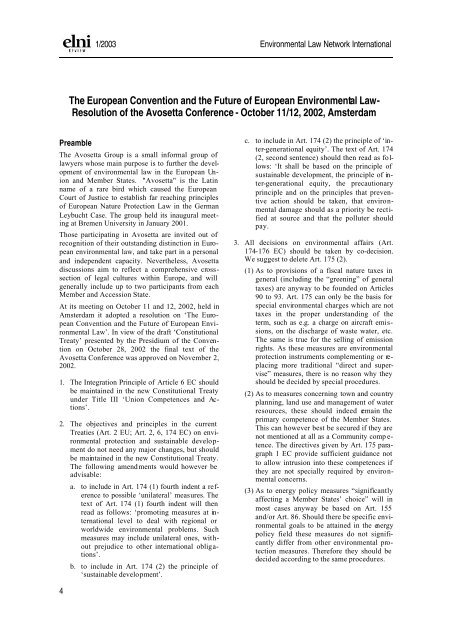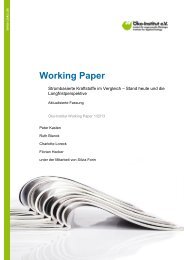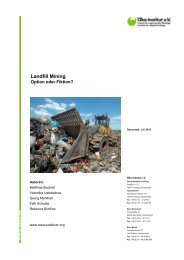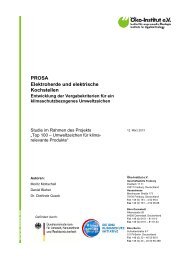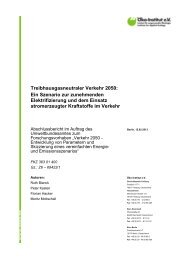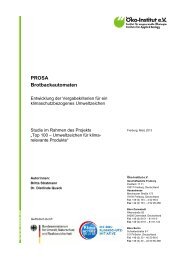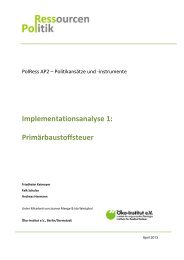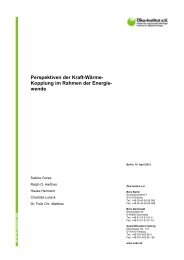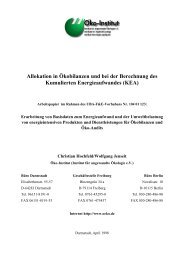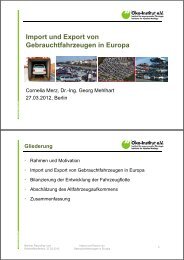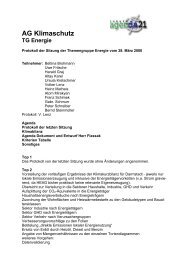elni NEWS - Öko-Institut eV
elni NEWS - Öko-Institut eV
elni NEWS - Öko-Institut eV
You also want an ePaper? Increase the reach of your titles
YUMPU automatically turns print PDFs into web optimized ePapers that Google loves.
Preamble<br />
4<br />
1/2003 Environmental Law Network International<br />
The European Convention and the Future of European Environmental Law-<br />
Resolution of the Avosetta Conference - October 11/12, 2002, Amsterdam<br />
The Avosetta Group is a small informal group of<br />
lawyers whose main purpose is to further the development<br />
of environmental law in the European Union<br />
and Member States. "Avosetta" is the Latin<br />
name of a rare bird which caused the European<br />
Court of Justice to establish far reaching principles<br />
of European Nature Protection Law in the German<br />
Leybucht Case. The group held its inaugural meeting<br />
at Bremen University in January 2001.<br />
Those participating in Avosetta are invited out of<br />
recognition of their outstanding distinction in European<br />
environmental law, and take part in a personal<br />
and independent capacity. Nevertheless, Avosetta<br />
discussions aim to reflect a comprehensive crosssection<br />
of legal cultures within Europe, and will<br />
generally include up to two participants from each<br />
Member and Accession State.<br />
At its meeting on October 11 and 12, 2002, held in<br />
Amsterdam it adopted a resolution on ‘The European<br />
Convention and the Future of European Environmental<br />
Law’. In view of the draft ‘Constitutional<br />
Treaty’ presented by the Presidium of the Convention<br />
on October 28, 2002 the final text of the<br />
Avosetta Conference was approved on November 2,<br />
2002.<br />
1. The Integration Principle of Article 6 EC should<br />
be maintained in the new Constitutional Treaty<br />
under Title III ‘Union Competences and Actions’.<br />
2. The objectives and principles in the current<br />
Treaties (Art. 2 EU; Art. 2, 6, 174 EC) on environmental<br />
protection and sustainable development<br />
do not need any major changes, but should<br />
be maintained in the new Constitutional Treaty.<br />
The following amendments would however be<br />
advisable:<br />
a. to include in Art. 174 (1) fourth indent a reference<br />
to possible ‘unilateral’ measures. The<br />
text of Art. 174 (1) fourth indent will then<br />
read as follows: ‘promoting measures at international<br />
level to deal with regional or<br />
worldwide environmental problems. Such<br />
measures may include unilateral ones, without<br />
prejudice to other international obligations’.<br />
b. to include in Art. 174 (2) the principle of<br />
‘sustainable development’.<br />
c. to include in Art. 174 (2) the principle of ‘inter-generational<br />
equity’. The text of Art. 174<br />
(2, second sentence) should then read as follows:<br />
‘It shall be based on the principle of<br />
sustainable development, the principle of inter-generational<br />
equity, the precautionary<br />
principle and on the principles that preventive<br />
action should be taken, that environmental<br />
damage should as a priority be rectified<br />
at source and that the polluter should<br />
pay.<br />
3. All decisions on environmental affairs (Art.<br />
174-176 EC) should be taken by co-decision.<br />
We suggest to delete Art. 175 (2).<br />
(1) As to provisions of a fiscal nature taxes in<br />
general (including the “greening” of general<br />
taxes) are anyway to be founded on Articles<br />
90 to 93. Art. 175 can only be the basis for<br />
special environmental charges which are not<br />
taxes in the proper understanding of the<br />
term, such as e.g. a charge on aircraft emissions,<br />
on the discharge of waste water, etc.<br />
The same is true for the selling of emission<br />
rights. As these measures are environmental<br />
protection instruments complementing or replacing<br />
more traditional “direct and supervise”<br />
measures, there is no reason why they<br />
should be decided by special procedures.<br />
(2) As to measures concerning town and country<br />
planning, land use and management of water<br />
resources, these should indeed remain the<br />
primary competence of the Member States.<br />
This can however best be secured if they are<br />
not mentioned at all as a Community comp etence.<br />
The directives given by Art. 175 paragraph<br />
1 EC provide sufficient guidance not<br />
to allow intrusion into these competences if<br />
they are not specially required by environmental<br />
concerns.<br />
(3) As to energy policy measures “significantly<br />
affecting a Member States’ choice” will in<br />
most cases anyway be based on Art. 155<br />
and/or Art. 86. Should there be specific environmental<br />
goals to be attained in the energy<br />
policy field these measures do not significantly<br />
differ from other environmental protection<br />
measures. Therefore they should be<br />
decided according to the same procedures.


